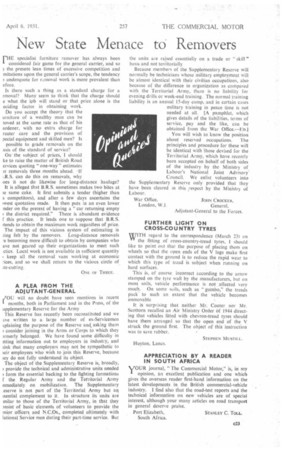New State Menace to Removers
Page 61

If you've noticed an error in this article please click here to report it so we can fix it.
'HE specialist furniture remover has always been I considered fair game for the general carrier, and so the present lean times of excessive competition and mitations upon the general carrier's scope, the tendency ) underquote for rmoval work is more prevalent than efore.
Is there such a thing as a standard charge for a !moval? Many seem to think that the charge should e what the iob will stand or that price alone is the eciding factor in obtaining work. Do you accept the theory that the urniture of a wealthy man can be loved at the same rate as that of his ardener, with no extra charge for reater care and the provision of pecial equipment and skilled men? Is possible to grade removals on the asis of the standard of service?
On the subject of prices, I should ke to raise the matter of British Road ervices quoting " one-way " estimates )r removals three months ahead. -If
can do this on removals, why oes it not do likewise for long-distance haulage? It is alleged that B.R.S. sometimes makes two bites at le same cake. It first submits a tender (higher than s competitors), and after a few days ascertains the iwest quotation made. It then puts in an even lower nder on the pretext of having a "car returning empty t the district required." There is abundant evidence F this practice. It leads one to suppose that B.R.S. itends to obtain the maximum work regardless of price. The impact of this vicious system of estimating is ;ling felt by the removers. Long-distance removals
becoming more difficult to obtain by companies who ave not geared up their organizations to meet such ctics, Local work is not available in sufficient quantity
keep all the rernoval vans working at economic ices, and so we shall return to the vicious circle of te-cutting.
ONE Of THREE.
A PLEA FROM THE ADJUTANT-GENERAL (OU will no doubt have seen mentions in recent months, both in Parliament and in the Press, of the upplementary Reserve for the Army This Reserve has recently been reconstituted and we ave written to a large number of ex-Servicemen
(plaining the purpose of the Reserve and asking them
consider joining in the Arms or Corps to which they irrnerly belonged. We have found some difficulty in Wing information out to employers in industry, and kink that many employers may not be sympathetic to ieir employees who wish to join this Reserve, because iey do not fully understand its object.
The object of the Supplementary Reserve is, broadly, t provide the technical and administrative units needed t form the essential backing to the fighting formations f the Regular Army and the Territorial Army nmediately on mobilization. The Supplementary .eserve is not part of the Territorial Army but an ;sential complement to it. In structure its units are milar to those of the Territorial Army, in that they
)nsist of basic elements of volunteers to provide the mior officers and N..C,Os, completed ultimately with lational Service men during their part-time service. But
the units are raised essentially on a trade or " skill " basis and not territorially Because members of the Supplementary Reserve will normally be technicians whose military employment will be almost identical with their civilian occupations, also because of the difference in organization as compared with the Territorial Army, there is no liability for evening drills or week-end training. The normal training liability is an annual 15-day camp, and in certain cases military training in peace time is not needed at all. [A pamphlet, which gives details of the liabilities, terms of service, pay and the like, can be obtained from the War Office.—ED.1
You will wish to know the position about reserved occupations. The principles and procedure for these will be identical with those devised for the Territorial Army, which have recently been accepted on behalf of both sides of the industry by the Ministry or Labour's National Joint Advisory' Council. We enlist volunteers into the Supplementary Reserve only provided that they have been cleared in this respect by the Ministry of Labour.
War Office, JOHN CROCKER,
London, W.I. General, Adjutant-General to the Forces.
FURTHER LIGHT ON CROSS-COUNTRY TYRES
WITH regard to the correspondence (March 23) on " the fitting of cross-country-tread tyres, I should like to point out that the purpose of placing them on wheels so that the open ends of the V lugs make first contact with the ground is to reduce the rapid wear to which this type of tread is subject when running on hard surfaces.
This is, of course incorrect according to the arrow stamped on the tyre wall by the manufacturers, but on most soils, vehicle performance is not affected very much. On some soils, such as "gumbo," the treads pack to such an extent that the vehicle becomes immovable
It is surprising that neither Mr. Cooter nor Mr. Scottorn recalled an Air Ministry Order 1;:tf 1944 directing that vehicles fitted with chevron-tread tyres should have them arranged so that the open end of the V struck the ground first. The object of this instruction was to save Tubber.
STEPHEN MUST1LL.
Huyton, Lancs.
APPRECIATION BY A READER IN SOUTH AFRICA
VOUR journal, "The Commercial Motor," is, in my I opinion, an excellent publication and one which gives the overseas reader first-hand information on the latest developments in the British commercial-vehicle industry. I find also that the road-test reports and the technical information on new vehicles are of special interest, although your many articles on road transport in general deserve praise.
Port Elizabeth, STANLEY C. TOLL
South Africa.




































































































